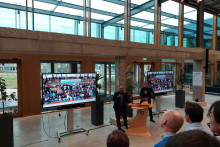Let’s first explain what a ‘focus country’ actually is. As Marlies Overbeek from the Marketing & Communications department puts it: ‘There are various types of focus countries: the ones where you want to recruit students and the ones you want to collaborate with. A good example is the U.S. We all want to work with the best American institutes, but how feasible is an idea that we will get a large number of American students to come here?’
The first type is what could be called ‘recruitment’ countries. The second group includes countries where the university strives to establish long-term research and educational collaborations. Naturally, some countries fall under both categories.
Regardless of the category, action plans have been worked out for each of the target countries. What differs is who developed them. The Marketing & Communications (M&C) department is logically responsible for marketing and recruitment strategies. It’s the Strategy & Policy (S&P) department, or to be precise the specially appointed country coordinators supported by S&P, that are in charge of the strategic development in the given country.
Examples of focus countries and their types
Country: strategic or recruitment approach
- Germany: both
- Brazil: both
- China: both
- India: recruitment
- Indonesia: both
- Mexico: both
- Australia: strategic
The beginning
‘The official notion of focus countries is only about two years old,’ explains Sander Lotze, Manager of International Affairs. ‘The main trigger to name specific focus countries was the increasing demand from the organization for structured help with specific educational collaboration. We started with China and Indonesia, but as internationalization took off we realized we needed more focus points. We approached individual faculties to see which countries it would be most useful and plausible to place strategic focus on. From our point of view it’s important that there are quality partners with high standards, but it’s the researchers who decide it in the end.’
Country coordinators
Once the S&P and faculties decided to actively focus on specific countries, creating the position of a country coordinator was the next logical step. ‘Country coordinators were assigned to establish or strengthen research and education contacts, to keep an eye on developments and possibilities in the given country and see how the UT could benefit from it,’ continues Lotze.
‘They have no marketing function, although they organically help to raise the profile of the UT in the country. Mostly, the coordinators are already affiliated with the country and they are here to share their knowledge. Why should every person who is interested in working in the country search for all the information all over again when it’s already here? Why reinvent the wheel?’
COUNTRY COORDINATORS
There are currently seven country coordinators, and one ‘coordinator of country coordinators’ David Pho, Senior Advisor International Relations (Department for Strategy & Policy).
Australia: Inge Broekman, CES
Brazil: Jelle Ferwerda, ET
Canada: Margriet Dekkers, BMS
China: Louis Winnubst, TNW
Germany: Marijke Stehouwer, TNW
Indonesia: Lyande Eelderink, ITC
Mexico: Karin Paardenkooper, CES
Being a country coordinator technically isn’t a full-time job. The UT employees generally have two days a week to perform their tasks as country coordinators. These approximately eight days a month and occasional trips to their assigned country form the majority of the university’s budget per target country.
Isn’t it too much for one person to be responsible for an entire country, especially with only two days a week to spend on the job? Possibly, admits David Pho. ‘This organization has only existed since 2016. It’s a kind of a pilot that we are currently evaluating. Our new goal is to support the country coordinators by creating an entire expert network that should also be involved in setting up the new strategic agendas. It shouldn’t be a one man or one woman show.’
Keeping an eye on an entire country certainly does sound like a tall order. In the upcoming series we will follow individual country coordinators and other relevant staff members to explore what kind of focus it takes to have a focus country.
Next week we will bring you Episode #2 with the story of India.







